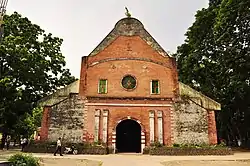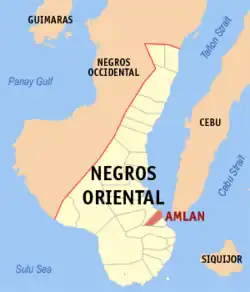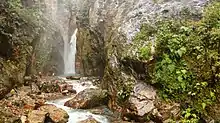Amlan
Amlan, officially the Municipality of Amlan (Cebuano: Lungsod sa Amlan; Tagalog: Bayan ng Amlan), is a 4th class municipality in the province of Negros Oriental, Philippines. According to the 2020 census, it has a population of 25,513 people.[3]
Amlan
Ayuquitan | |
|---|---|
| Municipality of Amlan | |
 Church of Amlan | |
 Flag | |
 Map of Negros Oriental with Amlan highlighted | |
OpenStreetMap | |
.svg.png.webp) Amlan Location within the Philippines | |
| Coordinates: 9°27′52″N 123°13′25″E | |
| Country | Philippines |
| Region | Central Visayas |
| Province | Negros Oriental |
| District | 2nd district |
| Barangays | 8 (see Barangays) |
| Government | |
| • Type | Sangguniang Bayan |
| • Mayor | Manuel Jose C. Sycip (NPC) |
| • Vice Mayor | Allan Marie R. Tan (NPC) |
| • Representative | Manuel T. Sagarbarria |
| • Municipal Council | Members |
| • Electorate | 18,364 voters (2022) |
| Area | |
| • Total | 111.85 km2 (43.19 sq mi) |
| Elevation | 29 m (95 ft) |
| Highest elevation | 334 m (1,096 ft) |
| Lowest elevation | 0 m (0 ft) |
| Population (2020 census)[3] | |
| • Total | 25,513 |
| • Density | 230/km2 (590/sq mi) |
| • Households | 6,158 |
| Economy | |
| • Income class | 4th municipal income class |
| • Poverty incidence | 12.70 |
| • Revenue | ₱ |
| • Assets | ₱ |
| • Expenditure | ₱ |
| • Liabilities | ₱ |
| Service provider | |
| • Electricity | Negros Oriental 2 Electric Cooperative (NORECO 2) |
| Time zone | UTC+8 (PST) |
| ZIP code | 6203 |
| PSGC | |
| IDD : area code | +63 (0)35 |
| Native languages | Cebuano Tagalog |
| Website | www |
Amlan was formerly known as Ayuquitan.[5]
Amlan is 21 kilometres (13 mi) from Dumaguete.
History
Nineteenth-century chronicler Licinio Ruiz mentions Alman, a settlement said to have been named after a superior kind of guava. The town was made a parish independent of Tanjay in 1848, was renamed Ayuquitan in 1912, became Amlan after WW II.
Its Church of St. Andrew the Apostle, completed in 1853 (and said to have taken 50 years to build), is the centerpiece of the town's tourism while providing photo opportunists with a colonial period backdrop. The ruins of watch towers against the Moro depredations of old can still be seen in Buswang and near the mouth of the Amlan River; and two others near the school building of Ayuquitan and barrio Calo.
Geography
Barangays
Amlan is politically subdivided into 8 barangays. Each barangay consists of puroks and some have sitios.
- Bio-os
- Jantianon
- Jugno
- Mag-abo
- Poblacion
- Silab
- Tambojangin
- Tandayag
Climate
| Climate data for Amlan, Negros Oriental | |||||||||||||
|---|---|---|---|---|---|---|---|---|---|---|---|---|---|
| Month | Jan | Feb | Mar | Apr | May | Jun | Jul | Aug | Sep | Oct | Nov | Dec | Year |
| Average high °C (°F) | 30 (86) |
30 (86) |
31 (88) |
33 (91) |
32 (90) |
31 (88) |
30 (86) |
30 (86) |
30 (86) |
29 (84) |
30 (86) |
30 (86) |
31 (87) |
| Average low °C (°F) | 22 (72) |
22 (72) |
22 (72) |
23 (73) |
24 (75) |
25 (77) |
24 (75) |
24 (75) |
24 (75) |
24 (75) |
23 (73) |
23 (73) |
23 (74) |
| Average precipitation mm (inches) | 26 (1.0) |
22 (0.9) |
28 (1.1) |
41 (1.6) |
95 (3.7) |
136 (5.4) |
147 (5.8) |
126 (5.0) |
132 (5.2) |
150 (5.9) |
98 (3.9) |
46 (1.8) |
1,047 (41.3) |
| Average rainy days | 7.5 | 6.7 | 8.9 | 10.4 | 21.6 | 25.6 | 26.3 | 25.0 | 24.1 | 26.2 | 19.2 | 12.1 | 213.6 |
| Source: Meteoblue (Use with caution: this is modeled/calculated data, not measured locally.)[6] | |||||||||||||
Demographics
| Year | Pop. | ±% p.a. |
|---|---|---|
| 1903 | 10,373 | — |
| 1918 | 12,525 | +1.26% |
| 1939 | 14,904 | +0.83% |
| 1948 | 13,342 | −1.22% |
| 1960 | 9,399 | −2.88% |
| 1970 | 11,547 | +2.08% |
| 1975 | 12,457 | +1.53% |
| 1980 | 13,638 | +1.83% |
| 1990 | 16,145 | +1.70% |
| 1995 | 16,573 | +0.49% |
| 2000 | 19,227 | +3.24% |
| 2007 | 22,173 | +1.99% |
| 2010 | 22,206 | +0.05% |
| 2015 | 23,624 | +1.19% |
| 2020 | 25,513 | +1.52% |
| Source: Philippine Statistics Authority[7][8][9][10] | ||
Economy
Tourism
Amlan is home to many natural and man-made attractions:
- Dreamland Nature and Adventure Park (DNAP)
- A ten-minute ride away from the highway, DNAP is divided into two parks: the Animal Kingdom that showcases a collection of wildlife and other endangered species and the Adventure Park for those wanting some adrenaline rush. Activities in the Adventure Park include aerial walk, river tubing, and soon to be opened avatar zip line, tandem zip line and giant tandem swing.
- Amlan Boulevard
- The boulevard will soon host an array of aquatic adventure sports and is developed to become the jump off point to the town's two marine sanctuaries.
- Tandayag Marine Sanctuary
- Touted as one of Tanon Strait's top sanctuaries, the sanctuary has not seen yet an overcrowding of scuba divers. The fisherfolk managing the area is keen in sustaining the carrying capacity of the marine reserve.
- Bio-os Takot-Diot Sanctuary
- The second center piece to Amlan's sustained efforts to marine conservation, Takot Diot is just a short hop from the coastline in Bio-os.

- Amlan Pasalan Falls
- The most majestic of the many falls found in Amlan, Pasalan is located in Silab Highlands. It can be accessed via all forms of vehicle but for the moment, anyone wanting to see the falls, must first secure approval from the local government for safety reasons.
- Kang-Untol Falls
- A prelude to its much bigger sister, Kang-Untol has a mini-lagoon for those wanting to soak in.

- Asupri sa Maiti
- A sulfur lagoon up in Jantianon Highlands, Asupri has seen an increase of tourists after photos and videos the attraction were posted in social media.
- Naparil and Cantalina Falls
- The most accessible falls in Amlan, Naparil is a short 20-minute walk from the main road in Silab.
- Lantawan Amlan
- The town's highest peak at 1,101 meters above sea level.
- Kang Atid
- A good place to start river trekking and explore the environs along the banks of the Amlan River.
- Jantianon Tri-Falls
- The location may be difficult to access ,but the three falls, namely, Paphaan, Divine and Paphaun, are sure to delight those weary souls wanting to get away from life's hustle and bustle.
- Products
- Cogon-based paper products courtesy of Marina - from fans, scrapbook, picture frames. The store is located at the Amlan Municipal Market.
- Jiovencio's arts and crafts - bamboo and coco shells fashioned into decorative items.
- Tonya's Budlit - "budbud with tsokolit", hence, "budlit" is a know pasalubong.[18]
Education
The public schools in the town of Amlan are administered by one school district under the Schools Division of Negros Oriental.
Elementary schools:
- Amlan Central Elementary School — Nat'l Highway, Mag-abo
- Aurelio Ibero Memorial Elementary School — Jugno
- Bio-os Elementary School — Bio-os
- Cañete Elementary School — Sitio Cañete, Jantianon
- Cantalina Elementary School — Sitio Cantalina, Silab
- Jantianon Elementary School — Jantianon
- Martin Benjamin Memorial Elementary School — Tambojangin
- Panusuan Elementary School — Sitio Panusuan, Silab
- Silab Elementary School — Silab
- Tandayag Elementary School — Tandayag
High schools:
- Amlan National High School — Rizal Street, Poblacion
- Amlan NHS - Jugno — Jugno
- Jantianon National High School — Jantianon
- Silab Community High School — Silab
Private schools:
- Seaview Learning Center — Prieto Street, Mag-abo
- St. Andrews School — Nat'l Highway, Poblacion
References
- Municipality of Amlan | (DILG)
- "2015 Census of Population, Report No. 3 – Population, Land Area, and Population Density" (PDF). Philippine Statistics Authority. Quezon City, Philippines. August 2016. ISSN 0117-1453. Archived (PDF) from the original on May 25, 2021. Retrieved July 16, 2021.
- Census of Population (2020). "Region VII (Central Visayas)". Total Population by Province, City, Municipality and Barangay. Philippine Statistics Authority. Retrieved 8 July 2021.
- "PSA Releases the 2018 Municipal and City Level Poverty Estimates". Philippine Statistics Authority. 15 December 2021. Retrieved 22 January 2022.
- "An act to change the name of the municipality of New Ayuquitan, province of Negros Oriental, to "Amlan" and the name of barrio Old Ayuquitan to "Ayuquitan"". LawPH.com. Retrieved 2011-04-09.
- "Amlan: Average Temperatures and Rainfall". Meteoblue. Retrieved 6 May 2020.
- Census of Population (2015). "Region VII (Central Visayas)". Total Population by Province, City, Municipality and Barangay. Philippine Statistics Authority. Retrieved 20 June 2016.
- Census of Population and Housing (2010). "Region VII (Central Visayas)" (PDF). Total Population by Province, City, Municipality and Barangay. National Statistics Office. Retrieved 29 June 2016.
- Censuses of Population (1903–2007). "Region VII (Central Visayas)". Table 1. Population Enumerated in Various Censuses by Province/Highly Urbanized City: 1903 to 2007. National Statistics Office.
- "Province of". Municipality Population Data. Local Water Utilities Administration Research Division. Retrieved 17 December 2016.
- "Poverty incidence (PI):". Philippine Statistics Authority. Retrieved December 28, 2020.
- "Estimation of Local Poverty in the Philippines" (PDF). Philippine Statistics Authority. 29 November 2005.
- "2003 City and Municipal Level Poverty Estimates" (PDF). Philippine Statistics Authority. 23 March 2009.
- "City and Municipal Level Poverty Estimates; 2006 and 2009" (PDF). Philippine Statistics Authority. 3 August 2012.
- "2012 Municipal and City Level Poverty Estimates" (PDF). Philippine Statistics Authority. 31 May 2016.
- "Municipal and City Level Small Area Poverty Estimates; 2009, 2012 and 2015". Philippine Statistics Authority. 10 July 2019.
- "PSA Releases the 2018 Municipal and City Level Poverty Estimates". Philippine Statistics Authority. 15 December 2021. Retrieved 22 January 2022.
- "Awesome Amlan". Awesome Amlan.